All the high-quality content available on the Internet relies on the strategic use of relevant keywords that form its backbone, ensuring better reception among readers. Keywords play a fundamental role in structuring various types of content, including blog posts, social media posts, and advertisements.
Simultaneously, an exceptional piece of content relies on thorough keyword research that serves as a reference point for selecting essential keywords to incorporate into the copy. This becomes even more critical when creating advertisements within your Google Ads account.
But, How to Do Keyword Research for PPC?
Keyword Research encompasses several vital features, including phrase matching and the integration of new keywords to keep the content up-to-date. However, when it comes to conducting keyword research for PPC (Pay-Per-Click), there are additional elements that gain significant importance. The following section highlights the key elements that should prominently feature in your content.
What Is PPC and How Can You Boost it with Keyword Research?

When building ads on platforms such as Google Ads, you must select a certain number of related words and phrases to your topic or subject. These words correspond to the keywords your ads will be based on.
Platforms will automatically build dozens of ads with the keywords you insert and descriptions you write. Moreover, these keywords define the target audience of PPC ads. In other words, search ads and different types of ads will appear to users who intend to know more about or to purchase your product.
How Can You Organize Your Keywords?
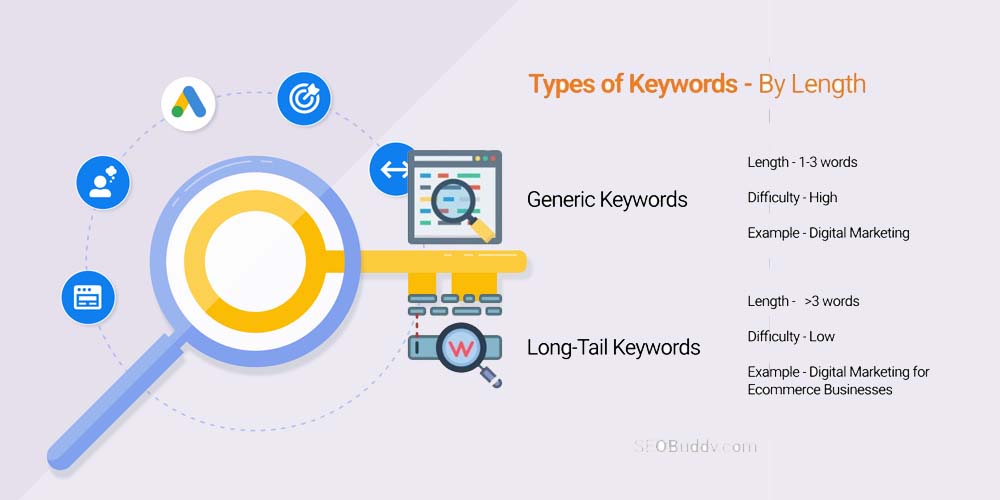
You can utilize several types of keywords when building your search, shopping, or social media ads.
- Generic terms or short tail keywords. These are terms related to the brand’s industry and define the ad in general terms.
- Brand terms. These are similar to the previous keywords but with a range only limited to the brand.
- Long-tail keywords. These correspond to keywords with a high-quality score since they’re more specific and represent a certain niche.
- Related terms. Terms that are not straightforwardly related to products or services you’re selling but that can appear when users search for items related to yours.
- Competitor terms. Terms that direct competitors have used and related to your product. These can also be the brand names of the competition offering similar products to yours.
| Generic terms | Brand terms | Long-tail terms | Related terms | Competitor terms |
| Running shoes | Nike shoes | Nike running shoes | Running | Adidas Tennis Shoes |
Performing a PPC Keyword Research in Simple Steps
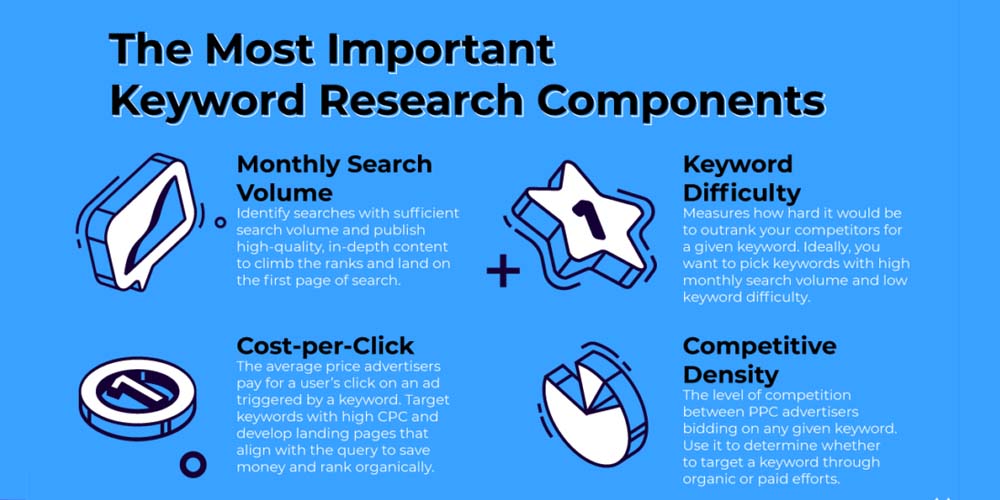
You can conduct programmatic keyword research for pay-per-click in six simple steps we briefly describe.
Define Your PPC Marketing Campaign Goals
The first goes first! You should be clear about your goals and objectives before running any keyword strategy or using keyword research tools. These can go from increasing the number of visitors to your landing page to increasing conversion rates in a specific period. Here are the goals you might consider:
- Increase website traffic: Generating more visits to a website is a common goal for many paid search campaigns. By targeting relevant keywords and optimizing ad copy, businesses can drive traffic to their website and increase overall brand visibility.
- Generate leads: PPC campaigns can focus on capturing potential customers’ information, such as email addresses or contact details, to build a lead database. This can be done through lead generation forms or landing pages designed to encourage visitors to take a specific action.
- Boost sales and revenue: For e-commerce businesses, the primary goal may be to increase online sales. PPC campaigns can target potential customers actively searching for specific products or services, driving them directly to product pages and optimizing for conversions.
- Enhance brand awareness: Sometimes the main objective is to create or increase brand awareness. By displaying ads across various platforms and targeting relevant audiences, businesses can increase their brand exposure and reach a broader set of potential customers.
- Promote specific offers or promotions: PPC campaigns can be designed to promote time-limited offers, discounts, or special promotions. These campaigns aim to attract customers who are looking for deals or incentives, driving them to take advantage of the specific offer.
- Improve search engine visibility: PPC campaigns can complement SEO efforts by targeting keywords where organic search rankings may be lower. By bidding on these keywords, businesses can appear at the top of Google search and increase their visibility.
- Enhance market research and insights: PPC campaigns can provide valuable data and insights into customer behavior, preferences, and the effectiveness of various advertising strategies. By analyzing metrics such as click-through rates, conversion rates, and keyword performance, businesses can refine their marketing strategies.
The important thing is you clarify the final objective of your PPC advertising campaign. To explain this, you can go to the following step.
Brainstorm a PPC Keyword List
Before passing to free keyword research tools, your team should gather to identify the most valuable keywords for your industry or topic.
For example, if your brand or company is in the gaming industry, you know that keywords like “gaming,” “video games,” “gamers,” or “players” are relevant to your niche.
At this point in the process, an exact match keyword is optional. Just have an intuitive approach to the keywords important to explain your product, brand, offer, or whatever you’re promoting.
Below are some crucial tips when brainstorming search terms for building your ads.
Some Tips for Brainstorming PPC Keywords
Brainstorming is more challenging than it sounds. Note that the following tips work for general keyword research beyond PPC.
- Go from broad keywords to more specific keywords. Keyword lists start with general keywords for a wide range of audiences, finishing with exact keywords with a smaller search intent. As we mentioned, keywords like “gaming” are broad keywords, but undoubtedly your strategy needs to consider words like “how to farm gold in WoW” or “How to get Ultima Weapon in Final Fantasy XIV.”
- Consider synonyms of relevant keywords or obscure keywords. An alternative to an exact keyword can bring more visitors who use related words to specify their search queries. For instance, you can replace the keyword “gaming” with “playing” or “gameplay.”
- Put yourself in the shoes of users. If you’re selling a product, you likely know much about that product, or you’re a fan of it. With this in mind, you can infer how consumers think and what keywords they will type when using search engines. Try to think as a prospect would to select the best keyword themes.
- Include keywords related to your offer. This sounds obvious, but using related keywords is crucial to broaden samples and keyword suggestions.
- Consider misspelled words. People do not write perfectly in English all the time. Due to rush or other causes, searchers type misspelled words that look similar to keywords with a high search volume. For instance, some people may type the word “gaming” as “gamin” or “gamming.”
Use a Keyword Research Tool to Expand and Refine Your List
If you already have selected a wide group of keywords, now it’s time to filter them to choose the most proper keywords for your ads that will effectively attract users interested in your products.
Of course, you can trust responsive research, but it’s more accurate if you conduct keyword research yourself. Now let’s go through some recommended tools to help you to develop a successful PPC campaign.
Google’s Keyword Planner
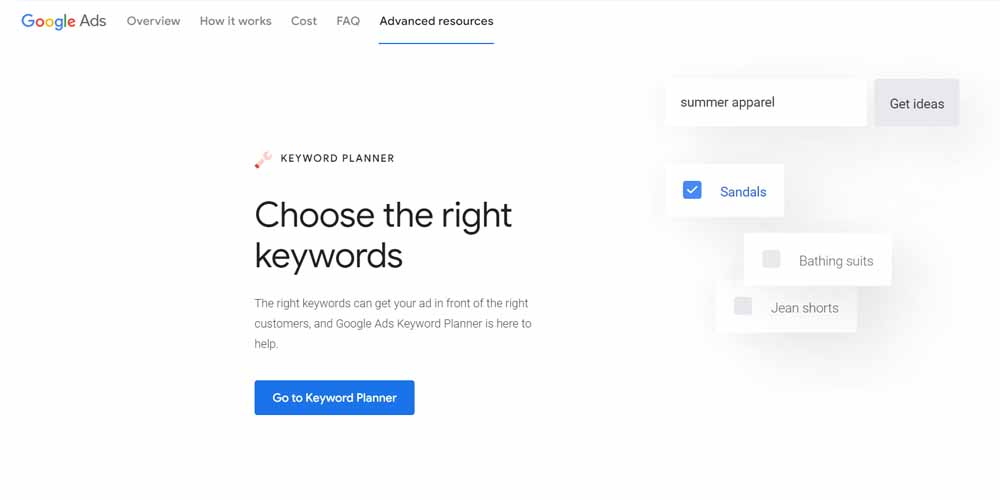
Google Keyword Planner is a free keyword research tool by autonomy and a valuable resource for companies or entrepreneurs looking to find the best keywords, especially for small businesses or startups.
With Google Keyword Planner, you can easily insert keywords you’re interested in evaluating. Just type the selected term in the search box, and the application will show you all the data related to the search term, such as average monthly searches, monthly search trends, and competition. Besides, Planner also lets you know about long and short-tail-related keywords.
Moreover, it also includes a refined tool to filter specific attributes according to related aspects to the keyword.
WordStream’s Free Keyword Tool
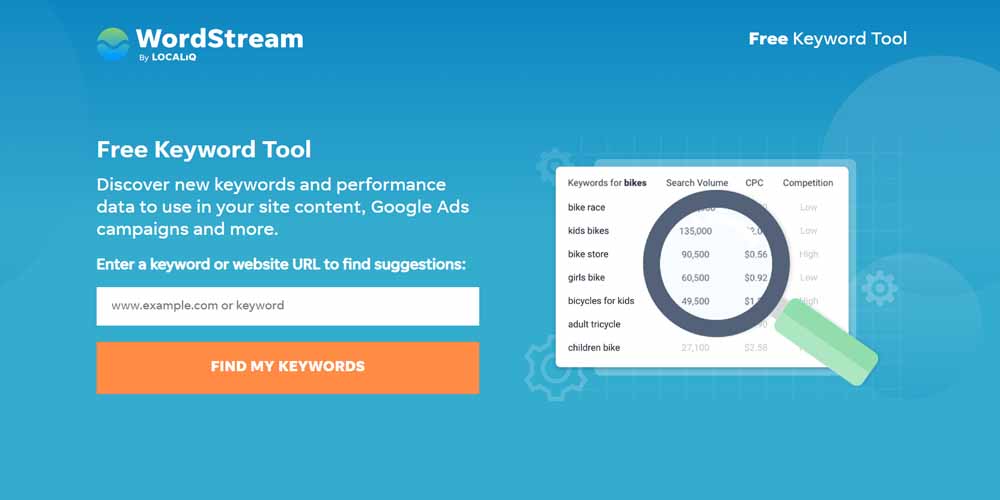
WordStream’s Keyword Research Tool comprises strategic advice about popular keywords and verticals. The functionality of Worstream’s research tool is simple since you only need to enter a URL or keyword, and the system automatically will analyze data and show you relevant keyword ideas extracted from these sources. These include new ideas and related high-volume keywords, long-tail variations, PPC competition, and search volume.
This valuable tool also allows you to filter according to location or industry, which will provide the top 25 keywords regarding the niche you describe. But that is not all! You can even get a complete list of keywords directly to your email address.
Finally, WordStream’s Free Keyword Tool puts a big database containing high-volume keywords at your disposal. Go to Popular Keywords Page to check the proper keywords for your ad campaigns.
Ahrefs Keywords Explorer
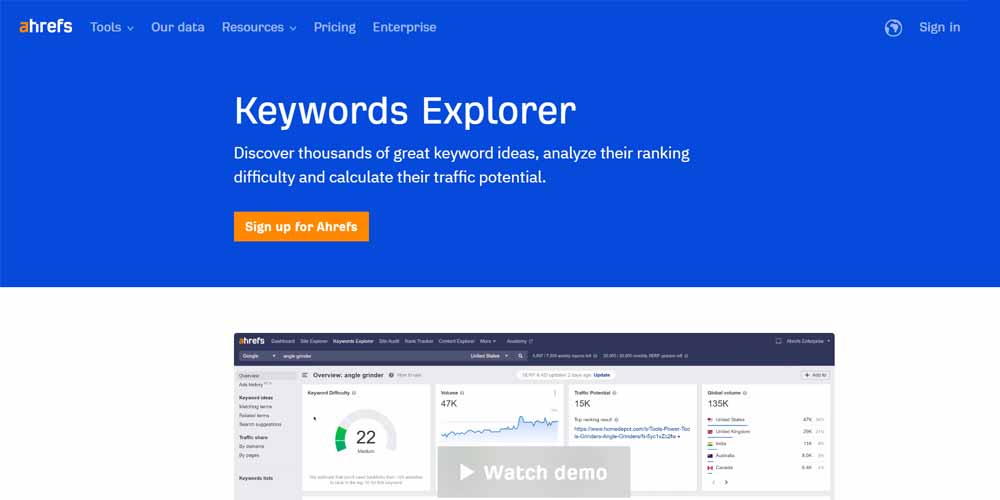
When analyzing all kinds of keyword types, checking their ranking, volume, traffic, and more, and dissecting ads from Google Adwords and other platforms, Ahrefs Keywords Explorer is the tool you need.
Ahrefs is the perfect keyword research tool for running a PPC strategy using different locations and several platforms. Ahrefs can estimate keywords for platforms like Amazon Ads, Youtube TrueView, Bing Ads, and more. Besides, this keyword explorer refines monthly search volume to ensure your keywords are always at the top.
Moreover, Ahrefs is great for PPC campaigns since it estimates an approximate number of keyword clicks. It also integrates useful keyword metrics, such as ROI, clicks per search, cost per click, percentage of paid clicks, and more.
AnswerThePublic
AnswerThePublic has a completely different approach than the other keyword explorers previously mentioned. AnswerThePublic emphasizes searches according to people’s questions about your entry in the search engines.
This tool does not work with data or search volume; it shows interesting visualizations explaining the most used approaches to your subject, which can be useful from a certain point of view.
Although this type of diagram might be a bit hard to understand, AnswerThePublic allows you to import data to CSV – Comma Separated Values – file. Besides, this tool boasts three free queries per day. The paid version includes extra features like customized viewing, alerts and monitoring, competitor brand analysis, and more.
Additional Aspects You Should Consider When Using an Explorer
The explorers mentioned above will help you determine which keywords to keep and discard. The above-mentioned keyword research tools will help you focus on search results and terms people are searching for in the current month.
Furthermore, explorers also give you a Competition rank divided into three categories: high, medium, and low. The high category means that most advertisers are bidding on these keywords.
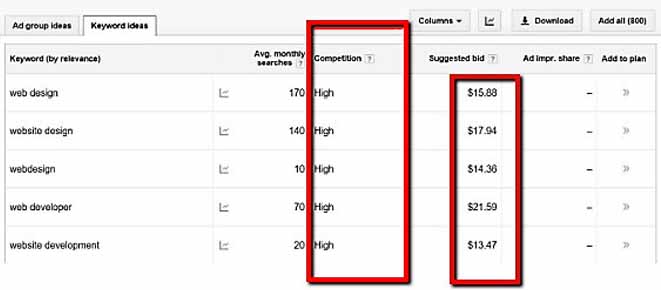
If you build ads containing these high-category keywords, you should pay more to get ads at the top.
We move on to one of the most important points of this process: choose fewer keywords but with high volume and low competition.
Look for High-Volume, Low-Competition Words
High-volume and low-competition keywords will drive outstanding traffic to your landing pages and websites at a relatively low cost. This is not easy because low search volume keywords are the cheapest to position, but they only drive a little traffic.
Not all keywords that tools suggest will be relevant for the ad group you’ve established.
Yes, we know that high-volume, low-competition keywords are not easy to find, but by managing the previous keyword explorers in good terms, you will obtain a list of keywords that satisfy these aspects.
Keep a Final Eye on Negative Keywords
Negative keywords correspond to keywords you don’t want to appear in your ads since they can be ad groups with non-existent interest. It means words that waste your budget, time, and effort. Negative keywords also prevent your ads from showing up alongside offensive or irrelevant queries. Do the following to identify negative keywords:
- Check query reports. When keyword research tools prepare a search query report of what searchers are looking for, you can check what keywords do not fit your purposes. These are the keywords you should avoid at any time.
- Know your negative match types. You can assign a match type to a negative keyword to block queries containing that term. In general, utilize broad match negatives to discard all the possible negative queries containing that negative term.
- Explore any negative keyword alternatives before launching your campaign. In a nutshell, explore all the possible negative terms and their synonyms that might negatively affect your campaign. This way, you’ll save more cash from going straight to the garbage can.
- Consider multi-level negatives. Remember that you can use these undesired keywords in multiple campaigns and ad groups.
- Don’t go overboard. Negative terms are useful when creating the ad copy, but remember that an improperly used single keyword of this nature can kill your impressions and hurt your account.
Paid ads are delicate, and you should not underestimate the effect of a good or bad campaign.
The best you can do to get a proper campaign fitting your brand and product is to work with an expert.
Hire an Expert Marketing Agency
Most marketers fail to add negative keywords when structuring campaigns and ad copies. Consequently, they lose money due to their ads showing up to people not interested in their products.
The most recommended way to avoid this bad practice is to work with a competent marketing agency specializing in PPC marketing campaigns, such as GamerSEO.

An agency of this nature will find the right keywords for your paid ads and define the proper PPC budget for your campaign according to your final goals.
A group of experts will conduct keyword research and study the content of your direct competitors to provide an overview of what edges your brand needs to address.
But that’s not all. A marketing agency will also help you to create the best ad copies possible for your industry by considering the latest trends to get higher conversion rates.
Measure the Quality of Keywords and Adjust Your Keyword Research
The final step is to measure results after the period of the campaign finishes. This practice will also clarify whether the keyword research you conducted was successful. To do this, you need to pay attention to KPIs, or Key Performance Indicators, which will provide you with real numbers and determine the success of your campaign. The most relevant KPIs are the following:
- The average Click-Through Rate. It corresponds to the number of people seeing a specific ad and effectively clicking it.
- The average cost-per-click, or average CPC. The total budget is divided by the number of people clicking the ad.
- The conversion rate. The percentage of users clicking the ad, entering the landing page, and completing the conversion.
The Bottom Line
Proper keyword research is based on two crucial factors: knowing the ideal audience to whom the campaign is targeting and defining what they are looking for. After clarifying both aspects, determining the best keyword research method is up to you.
The proper way is to hire a marketing agency that runs all the processes on your behalf. This way, you save time and money and get the best results, which translates into better sales for your business.
Please check our blog periodically for other helpful articles related to clicks, conversions, and keyword research. We’re continuously uploading posts delivering tips for small businesses and startups.

A dedicated copywriter with over 3 years of experience behind him. He loves writing about SEO, video games, and the ever-evolving world of NFTs. Passionate about content that performs (and preferably ranks on page one), while habitually overthinking meta descriptions. When he’s not at the keyboard, you’ll find him deep in a story-driven game or somewhere lost (on purpose) in the mountains—preferably without cell signal.


This blog gives a significant bit by bit manual for dominating catchphrase research for PPC crusades. From distinguishing high-influence catchphrases to understanding client plan, it covers urgent perspectives in an unmistakable and coordinated way.